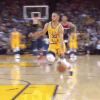BorisDK1 wrote:On what basis do you make that assertion? It seems you've come up with an ad hoc assignment of blame based on gross generalization ("defense at the point guard position is a luxury").
It's based on looking at the minimum and maximum defensive RAPM at each position last season:
PG -2.9...2.2
SG -1.9...3.3
SF -1.9...3.1
PF -2.2...3.7
C -2.8...3.1
Note that the low end of the PG (-2.9) is almost a full point lower than every other position, except center (we'll get to that in a minute). And the maximum DRAPM for PG is almost a full point lower than every other position. That's what I'm referring to.
By the way, for reference, Calderon's DRAPM last season was -0.2.
And which center was -2.8? Ok, that's easy. It was Bargnani. Take him out, and the lowest DRAPM for centers last season was -2.2.
I understand you think Calderon is horrible. Try watching Stephen Curry, or maybe Luke Ridnour for a full season. Like I said, I don't think Calderon's defense is your biggest problem right now. Because you ain't gonna be able to replace him with somebody much better in all likelihood. But Bargs? Pretty much any stiff would be better. Hell, even Andris Biedrins would be an improvement on defense.










